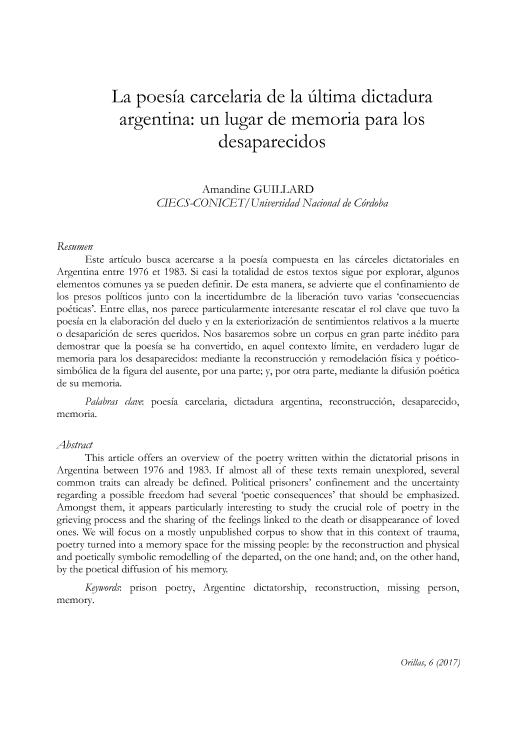Mostrar el registro sencillo del ítem
dc.contributor.author
Guillard, Amandine Marie

dc.date.available
2018-03-09T19:37:36Z
dc.date.issued
2017-06
dc.identifier.citation
Guillard, Amandine Marie; La poesía carcelaria: un lugar de memoria para los desaparecidos; Padova University Press; Orillas; 6; 6-2017; 293-307
dc.identifier.issn
2280-4390
dc.identifier.uri
http://hdl.handle.net/11336/38450
dc.description.abstract
Este artículo busca acercarse a la poesía compuesta en las cárceles dictatoriales en Argentina entre 1976 et 1983. Si casi la totalidad de estos textos sigue por explorar, algunos elementos comunes ya se pueden definir. De esta manera, se advierte que el confinamiento de los presos políticos junto con la incertidumbre de la liberación tuvo varias ‘consecuencias poéticas’. Entre ellas, nos parece particularmente interesante rescatar el rol clave que tuvo la poesía en la elaboración del duelo y en la exteriorización de sentimientos relativos a la muerte o desaparición de seres queridos. Nos basaremos sobre un corpus en gran parte inédito para demostrar que la poesía se ha convertido, en aquel contexto límite, en verdadero lugar de memoria para los desaparecidos: mediante la reconstrucción y remodelación física y poéticosimbólica de la figura del ausente, por una parte; y, por otra parte, mediante la difusión poética de su memoria.
dc.description.abstract
This article offers an overview of the poetry written within the dictatorial prisons in Argentina between 1976 and 1983. If almost all of these texts remain unexplored, several common traits can already be defined. Political prisoners’ confinement and the uncertainty regarding a possible freedom had several ‘poetic consequences’ that should be emphasized. Amongst them, it appears particularly interesting to study the crucial role of poetry in the grieving process and the sharing of the feelings linked to the death or disappearance of loved ones. We will focus on a mostly unpublished corpus to show that in this context of trauma, poetry turned into a memory space for the missing people: by the reconstruction and physical and poetically symbolic remodelling of the departed, on the one hand; and, on the other hand, by the poetical diffusion of his memory
dc.format
application/pdf
dc.language.iso
spa
dc.publisher
Padova University Press
dc.rights
info:eu-repo/semantics/openAccess
dc.rights.uri
https://creativecommons.org/licenses/by-nc-sa/2.5/ar/
dc.subject
Poesía Carcelaria
dc.subject
Dictadura Argentina
dc.subject
Reconstrucción
dc.subject
Desaparecido
dc.subject
Memoria
dc.subject.classification
Estudios Generales del Lenguaje

dc.subject.classification
Lengua y Literatura

dc.subject.classification
HUMANIDADES

dc.title
La poesía carcelaria: un lugar de memoria para los desaparecidos
dc.type
info:eu-repo/semantics/article
dc.type
info:ar-repo/semantics/artículo
dc.type
info:eu-repo/semantics/publishedVersion
dc.date.updated
2017-12-12T20:05:18Z
dc.journal.number
6
dc.journal.pagination
293-307
dc.journal.pais
Italia

dc.journal.ciudad
Padova
dc.description.fil
Fil: Guillard, Amandine Marie. Consejo Nacional de Investigaciones Científicas y Técnicas. Centro Científico Tecnológico Conicet - Córdoba. Centro de Investigaciones y Estudios sobre Cultura y Sociedad. Universidad Nacional de Córdoba. Centro de Investigaciones y Estudios sobre Cultura y Sociedad; Argentina
dc.journal.title
Orillas
dc.relation.alternativeid
info:eu-repo/semantics/altIdentifier/url/http://orillas.cab.unipd.it/orillas/es/06_02guillard_arribos/
Archivos asociados
